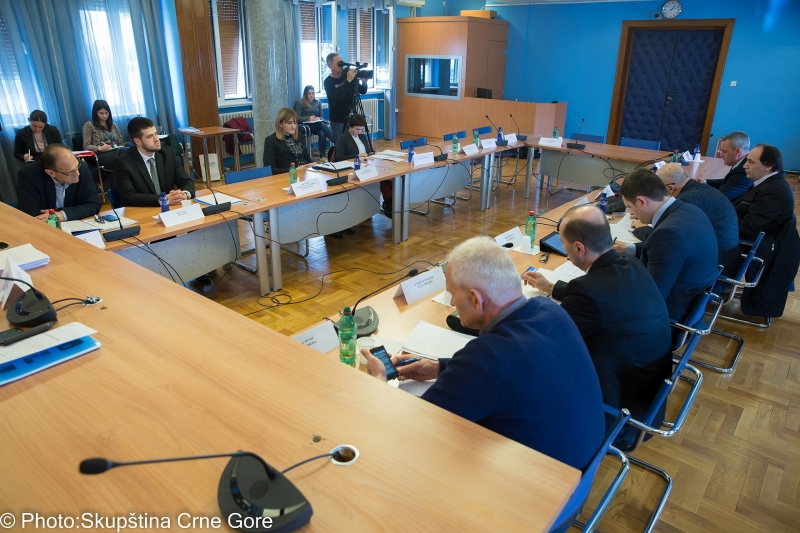At its Third Meeting held today, in accordance with Article 162 of the Rules of Procedure of the Parliament, the Committee considered the 2015 Performance Report of the Fund for Protection and Exercising of Minority Rights.
The Fund’s Director Mr Safet Kurtagić pointed out that the reason for the overdue submission of the Report was due to the fact that the Decision on the first allocation of funds had been adopted in late May 2015, and the second in mid-August of the same year. The signing of the contract on financing and co-financing of projects was implemented after one month. The rulebook on criteria for evaluating projects and distribution of funds for financing and co-financing of projects from the funds of the Fund says that implementation of the supported projects may last up to a year, and that the final report on implementation should be submitted no later than one month since the completion of implementation. A significant number of users of the funds were justified in prolonging this deadline, and with not many staff who are also not experienced enough the Fund needs at least two or three months to evaluate projects, which also contributed to the delay in submission of the report. He reminded that domestic and international institutions, including the Parliament of Montenegro, State Audit Institution, non-governmental organisations, and a significant number of the Montenegrin public, were explicit in their request that the Fund should perform monitoring and evaluation of the implemented projects and that it should notify the responsible institutions and the interested public on the results of its activities, which was also one of the reasons for the delay in submission of the report. Along with the report they also submitted the most significant statistical data on distribution of funds and implementation of supported projects, and there are data on the Fund’s website on each supported project separately, from 2008 to 2015.
Chairperson of the Committee Mr Halil Duković pointed out that the Fund for Protection and Exercising of Minority Rights was one of the most significant institutions for protection of cultural heritage and customs of minority peoples and other minority national communities. In practice, the Fund justified its existence because a large number of projects oriented towards preservation and development of national or ethical specifics of minority people in the field of national, ethical, cultural, linguistic, and religious identity was implemented owing to the funds of the Fund. A certain number of criticisms was voiced regarding the work of the Fund, out of which the majority was unfounded. He voiced his expectation that the adoption of the Law on Amendments to the Law on Minority Rights and Freedoms, which is waiting for vote in the second round in the Parliament, would contribute to the improvement of further regulation of the work of the Fund. He reminded that the Constitutional Court adopted six rulings to overturn decisions on distribution of the funds of the Fund. He concluded that the Fund as an institution should survive in the interest of minority peoples, as well as all citizens of Montenegro, which is why support should be given to its work.
Committee member Mr Suad Numanović estimated that the adoption of the Law on Amendments to the Law on Minority Rights and Freedoms would close the circle not only on the legislative, but also the institutional framework of protection of minority peoples. He voiced his expectation that the adoption of this law and the strengthening of the staff capacity of the Fund would improve its effectiveness, especially in part of distribution of funds.
Following the discussion, the Committee unanimously supported the 2015 Performance Report of the Fund for Protection and Exercising of Minority Rights and proposed to the Parliament to accept it.
At today’s meeting, the Committee considered the events in the Parliament of Montenegro occurring after the Sitting of the First Extraordinary Session of the Parliament in 2017, held on 15 February 2017. On that occasion, the Committee unanimously adopted the Conclusion which it forwarded to the Collegium of the President of the Parliament of Montenegro and a statement to the media.
Furthermore, the Committee on Human Rights and Freedoms unanimously adopted the 2016 Performance Report, 2017 Activity Plan, as well as nine reports and information on activities of the Committee in the period June-December 2016.
It was estimated that the 2016 Performance Report had good quality, with detailed overview of all activities, both those determined by the 2016 Plan, as well as the additional 20 activities implemented mostly within international cooperation. The Chairperson of the Committee explained that the intensity of activities of the Committee in 2016 was reduced due to objective reasons, namely due to blocking of the work of the Committee which was influenced by the change of the parliamentary majority because the majority in the Committee was the opposition, as well as due to commitments which the MPs, members of the Committee, had on the occasion of holding of the ordinary parliamentary elections.
The Committee members and participants in the meeting agreed in their assessment that the 2017 Activity Plan of the Committee on Human Rights and Freedoms was ambitious, of good quality, and comprehensive. The Chairperson of the Committee reminded that the Proposal for the Plan was previously forwarded to about 40 relevant addresses, from which they received a certain number of suggestions, and some of them were accepted. The Plan determined 25 activities in the field of protection from discrimination, prevention of torture, protection of rights of persons deprived of their liberty, personal data protection, rights of persons with disabilities, with special emphasis on the rights of children with developmental disabilities and protection of the rights of the child in order to reach standards defined by the UN Convention on the Rights of the Child. They voiced their expectation that the implementation of the 2017 Plan of the Committee, through multisector approach, would contribute to the state of human rights in Montenegro.












